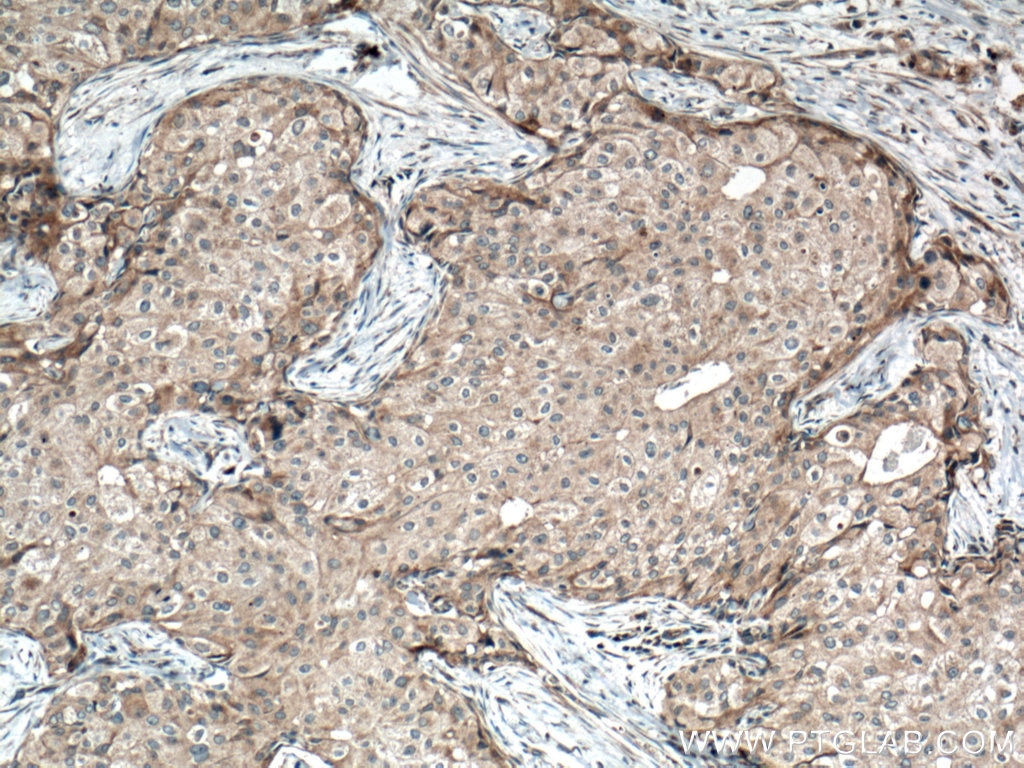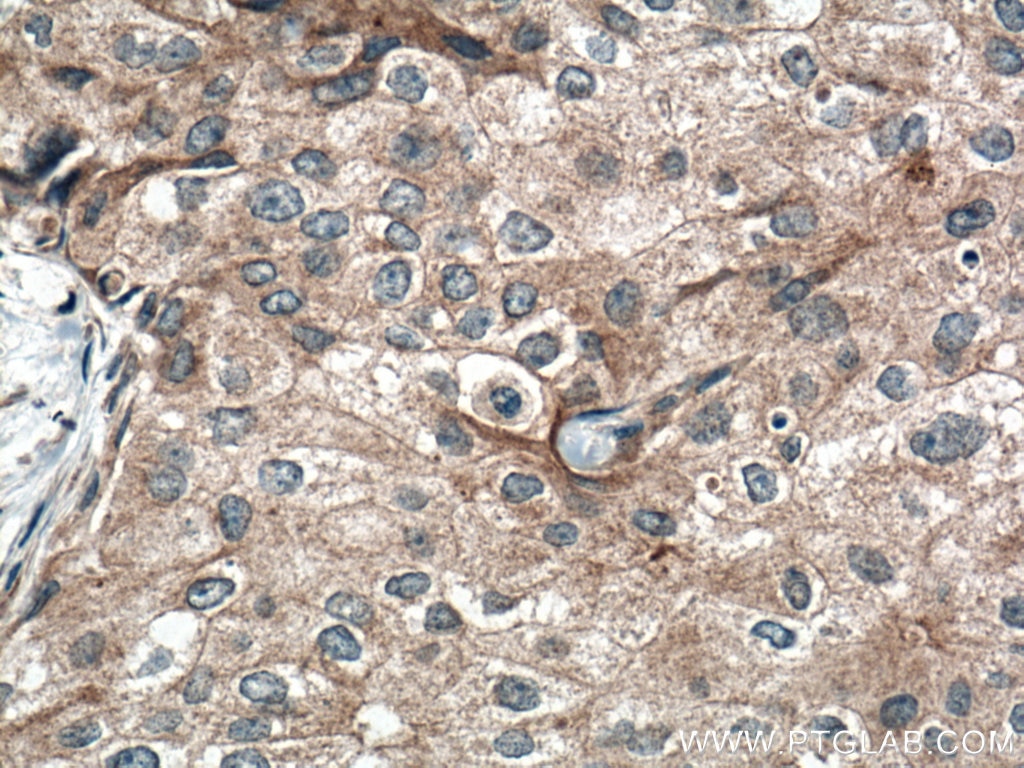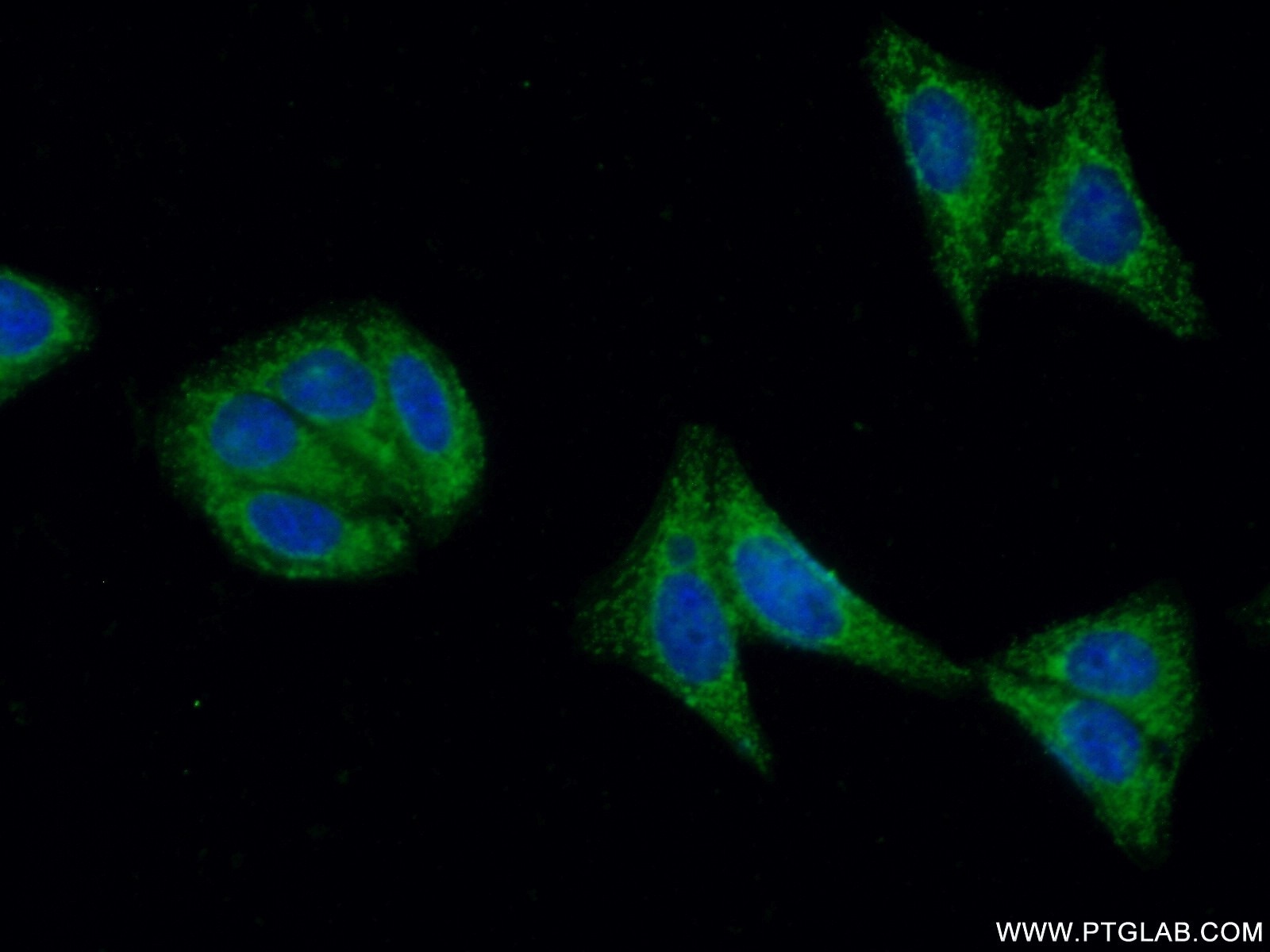- Featured Product
- KD/KO Validated
FGFR4 Polyklonaler Antikörper
FGFR4 Polyklonal Antikörper für WB, IHC, IF/ICC, ELISA
Wirt / Isotyp
Kaninchen / IgG
Getestete Reaktivität
human und mehr (1)
Anwendung
WB, IHC, IF/ICC, ELISA
Konjugation
Unkonjugiert
Kat-Nr. : 11098-1-AP
Synonyme
Geprüfte Anwendungen
| Erfolgreiche Detektion in WB | L02-Zellen |
| Erfolgreiche Detektion in IHC | humanes Mammakarzinomgewebe Hinweis: Antigendemaskierung mit TE-Puffer pH 9,0 empfohlen. (*) Wahlweise kann die Antigendemaskierung auch mit Citratpuffer pH 6,0 erfolgen. |
| Erfolgreiche Detektion in IF/ICC | HepG2-Zellen |
Empfohlene Verdünnung
| Anwendung | Verdünnung |
|---|---|
| Western Blot (WB) | WB : 1:500-1:2000 |
| Immunhistochemie (IHC) | IHC : 1:50-1:500 |
| Immunfluoreszenz (IF)/ICC | IF/ICC : 1:50-1:500 |
| It is recommended that this reagent should be titrated in each testing system to obtain optimal results. | |
| Sample-dependent, check data in validation data gallery | |
Veröffentlichte Anwendungen
| KD/KO | See 2 publications below |
| WB | See 11 publications below |
| IHC | See 4 publications below |
| IF | See 7 publications below |
Produktinformation
11098-1-AP bindet in WB, IHC, IF/ICC, ELISA FGFR4 und zeigt Reaktivität mit human
| Getestete Reaktivität | human |
| In Publikationen genannte Reaktivität | human, Maus |
| Wirt / Isotyp | Kaninchen / IgG |
| Klonalität | Polyklonal |
| Typ | Antikörper |
| Immunogen | FGFR4 fusion protein Ag1573 |
| Vollständiger Name | fibroblast growth factor receptor 4 |
| Berechnetes Molekulargewicht | 88 kDa |
| Beobachtetes Molekulargewicht | 95, 100-110 kDa |
| GenBank-Zugangsnummer | BC011847 |
| Gene symbol | FGFR4 |
| Gene ID (NCBI) | 2264 |
| Konjugation | Unkonjugiert |
| Form | Liquid |
| Reinigungsmethode | Antigen-Affinitätsreinigung |
| Lagerungspuffer | PBS with 0.02% sodium azide and 50% glycerol |
| Lagerungsbedingungen | Bei -20°C lagern. Nach dem Versand ein Jahr lang stabil Aliquotieren ist bei -20oC Lagerung nicht notwendig. 20ul Größen enthalten 0,1% BSA. |
Hintergrundinformationen
Fibroblast growth factor receptor 4 (FGFR4) is a member of a highly conserved tyrosine kinase family, along with FGFR1-3. This family consists of an intracellular tyrosine kinase domain, a single transmembrane domain, and extracellular ligand-binding domains (PMID: 32492514). FGFR4 is the predominant FGFR isoform present in human hepatocytes. FGFR4 has been proposed to play a role in the observed induction of hepatocyte proliferation and carcinogenesis by FGF19; however, contradicting evidence proposing a protective role for FGFR4 in suppressing hepatoma progression has also been proposed(PMID: 20018895). While the role of FGFR4 in cancer remains to be fully elucidated, several findings suggest that this receptor may be an important player in Hepatocellular carcinoma (HCC) development and/or progression(PMID: 10336501).
Protokolle
| PRODUKTSPEZIFISCHE PROTOKOLLE | |
|---|---|
| WB protocol for FGFR4 antibody 11098-1-AP | Protokoll herunterladen |
| IHC protocol for FGFR4 antibody 11098-1-AP | Protokoll herunterladenl |
| IF protocol for FGFR4 antibody 11098-1-AP | Protokoll herunterladen |
| STANDARD-PROTOKOLLE | |
|---|---|
| Klicken Sie hier, um unsere Standardprotokolle anzuzeigen |
Publikationen
| Species | Application | Title |
|---|---|---|
J Med Chem FGF19-Based Mini Probe Targeting FGFR4 for Diagnosis and Surgical Navigation of Hepatocellular Carcinoma
| ||
Biochem Pharmacol Association between the perturbation of bile acid homeostasis and valproic acid-induced hepatotoxicity. | ||
Biomed Pharmacother Bupleuri radix extract ameliorates impaired lipid metabolism in high-fat diet-induced obese mice via gut microbia-mediated regulation of FGF21 signaling pathway. | ||
J Cell Biochem Glycosylation of FGFR4 in cholangiocarcinoma regulates receptor processing and cancer signaling. | ||
Int J Oncol Role of fibroblast growth factor 4 in the growth and metastasis of colorectal cancer. | ||
Cancer Res Treat FGFR4 Gly388Arg Polymorphism Affects the Progression of Gastric Cancer by Activating STAT3 Pathway to Induce Epithelial to Mesenchymal Transition. |
Rezensionen
The reviews below have been submitted by verified Proteintech customers who received an incentive for providing their feedback.
FH Jillian (Verified Customer) (05-27-2025) | Overall we weren't as happy with the antibody as we wanted to be. There appeared to be a lot of nonspecific binding in the NHP samples that we tested it on
|





